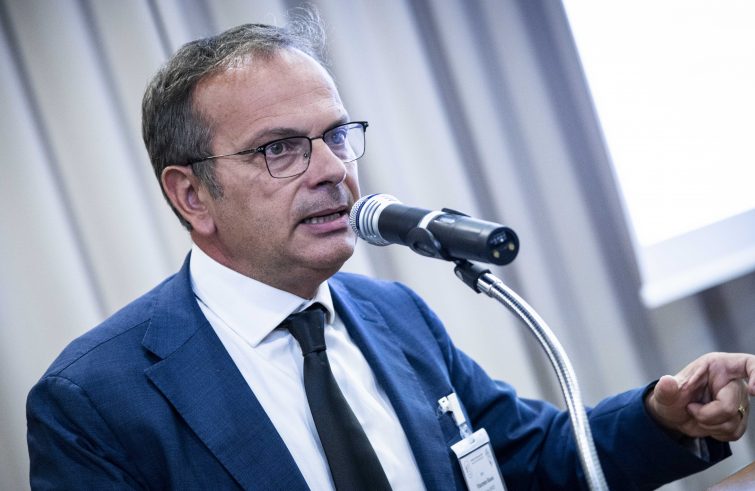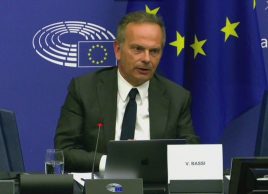
“It must be understood that the family is a private ‘matter’, but it is one with great public relevance. And it can trigger processes that serve the public good, which is why it must be sustained. These are not religious or ideological arguments – as some would suggest -: the family is an asset for our societies that are facing challenging times, deeply scarred by the pandemic and the fallout of the war in Ukraine”, says Vincenzo Bassi, the President of the Federation of Catholic Family Associations in Europe ( FAFCE), an umbrella organisation representing 32 associations from 20 European states (http://www.fafce.org). SIR met him in Strasbourg, in the European Parliament building. He is a lawyer and carries out his service at FAFCE, travelling extensively (including to Strasbourg, Frankfurt, Rome… he is now headed to Prague for a Ministerial Conference under the Czech Presidency of the EU). “We realise that our commitment is beneficial”, he confides, “also as a result of the commitment of previous members. We are working with numerous stakeholders: in civil society, at ecclesial level, in public institutions. This is why we need more resources, both human and financial.”
 Let’s start with the recent audience with Pope Francis at the Vatican on the occasion of the 25th anniversary of the foundation of FAFCE. In his speech, Pope Francis highlighted families’ contribution to the reception of Ukrainian refugees. This is a very meaningful recognition…
Let’s start with the recent audience with Pope Francis at the Vatican on the occasion of the 25th anniversary of the foundation of FAFCE. In his speech, Pope Francis highlighted families’ contribution to the reception of Ukrainian refugees. This is a very meaningful recognition…
It certainly is. In fact, this is indeed a reality. Families are not only responsible for their own members, but also for those around them. The family is a driving force of solidarity, a concrete example of subsidiarity. The widespread hospitality offered by so many families in Europe who have opened their doors to those fleeing from war testifies to this fact. This is a confirmation of the role played by families in the course of history. Families are the first who care for the poor, the lonely or vulnerable, thereby creating communities.
Nevertheless, serious challenges lie ahead. The conflict sparked off by Russia is propelling food, gas and electricity prices higher. Inflation has now reached barely sustainable levels. Is there a risk that many families will be brought to their knees in the coming months?
Families’ purchasing power is deteriorating. And this could indeed lead to serious social unrest. I see new forms of household loneliness, which require financial and fiscal measures (e.g. equitable taxation).
Family networks, mutual assistance, economies of scale at household level should be the object of major efforts…
One-off payments that some countries offer have a palliative effect, and they don’t provide systemic solutions. Government interventions, including in terms of legislation, can produce concrete results, but only if civil society is simultaneously mobilised, if it is understood that the family is a public resource, aimed at the common good.
In your travels throughout Europe, have you come across some national measures that respond to these concerns?
It should be noted that France has traditionally pursued family-friendly policies, as confirmed by French birth rate figures. We recently identified some promising decisions and measures taken in Hungary and the Czech Republic, although in those cases they mostly consist of State interventions, not always concerned with involving the social fabric or family associations. Should the political orientation of those governments change, such policies might be shelved. We continue insisting that family associations should act as the interlocutors with national governments, and that reward – and not only supportive – policies are needed.
The European Parliament ‘s plenary session in Strasbourg focuses once again on the issue of abortion in the United States. This issue does not fall within the competence of the European Union, and furthermore, a ruling by the Supreme Court of a non-Member State is being discussed. What is your opinion?
I believe an ideological attitude is at work here. The claim is to make abortion a subjective right, which is not corroborated by international jurisprudence. On the other hand, the right to life is acknowledged and enshrined therein. Rather, I wonder why support is not given to women not wishing to undergo an abortion.
Nor does anyone mention the young married couples wishing to have children, but who cannot have a family due to work-related difficulties or housing costs…
In this area I hope to see the commitment of European policy-makers and of civil and ecclesial realities. Young married couples need a favourable context and beautiful, encouraging role models, who convey the idea that the family is a joyful responsibility.
One more question. FAFCE has long argued that the family is a response to nationalism. What does this mean?
As we argued in a paper drafted for the Conference on the Future of Europe, democracy is impossible without families and their generative contribution to the future of their communities. Families should therefore be duly recognised for their role as agents of democracy, coexistence, and openness, and as poles of social action and key players in demographic and family policies. Families play a fundamental role in local communities, open to the future. Families have the ability to transmit democratic principles while sharing them within the community, by means of family networks and family associations. Such as those that give life to FAFCE.








